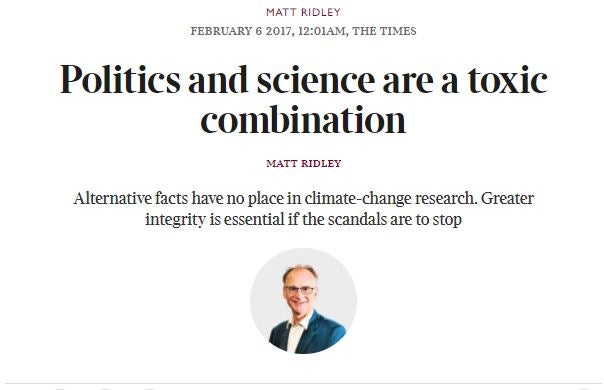
A campaigner who highlights concerns about climate change has lost an IPSO complaint a column against The Times over an article which accused climate change scientists of promoting “fake news”.
Bob Ward, of the Grantham Institute on climate change, argued that The Times breached Clause 1 of the Editors’ Code, covering accuracy, with an article headlined: “Politics and science are a toxic combination” published on 6 February.
The opinion piece expressed the columnist’s views on claims made in an
online blog by Dr John Bates, a climate scientist formerly employed at
the US National Oceanic and Atmospheric Administration (NOAA).
In the blog Dr Bates detailed his concerns about the archiving and
documentation of two sets of temperature data, which had underpinned a
climate study published in the journal Science on 4 June 2015.
The study, widely referred to as the “Pausebuster” paper, suggested that
there had been no “pause” in global warming in the 2000s, as other
research had appeared to show.
Dr Bates said the “Pausebuster” paper was itself wrong – meaning that climate change had in fact seen a “pause” for 18 years.
Ridley said that by failing to acknowledge the flaws in the “Pausebuster” paper “scientists themselves have been indulging in alternative facts, fake news and policy-based evidence”.
Ward denied the substance of Dr Bates’ claims and complained further
that the significance of these concerns was misrepresented, and that the
newspaper had taken no steps to establish the veracity of the claims, in
breach of its obligations under Clause 1.
The newspaper said the article was clearly identifiable as an opinion
piece; the columnist had accurately reported Dr Bates’ claims, and was
entitled to express his opinion on them. It noted that Dr Bates had
checked the accuracy of the article before publication.
The columnist’s criticism of scientists for “indulging in alternative
facts and fake news” was a reasonable interpretation of Dr Bates’
concerns, said the newspaper.
The press regulator’s complaints committee said the newspaper was entitled to report the views of Dr Bates, a leading former climate scientist at the NOAA, about the ‘Pausebuster’ paper and the circumstances surrounding its publication.
It said that the columnist’s characterisation of the substance of Dr Bates’ claims was very strong: he had asserted that Dr Bates has alleged that
scientists were indulging in “alternative facts, fake news and
policy-based evidence”.
The Committee noted that this appeared on its face to conflict with Dr Bates’ subsequent public statement that there was “no data tampering, no data changing, nothing malicious”.
But Dr Bates had claimed in the blog that a “thumb on the scale” pushed
for decisions that would create a desired outcome, and described the
process as a “flagrant manipulation of scientific integrity guidelines”.
“Fake news” and “alternative facts” are currently ill-defined terms, and
the committee concluded on balance that the nature of these allegations
was such that the columnist was entitled to characterise them in this
way.
The committee said Ridley was entitled to express his opinion on the
significance of these claims; to draw comparisons between previous
“scandals” within the scientific community; and to comment on the wider
implications of Dr Bates’ concerns in that community, as well as on
policy decisions on climate change.
Email pged@pressgazette.co.uk to point out mistakes, provide story tips or send in a letter for publication on our "Letters Page" blog
